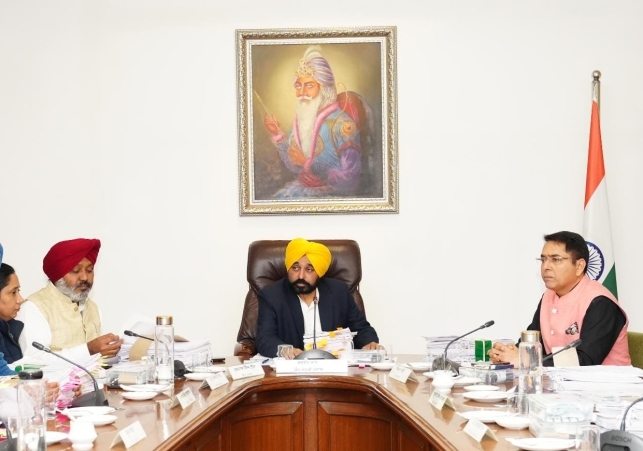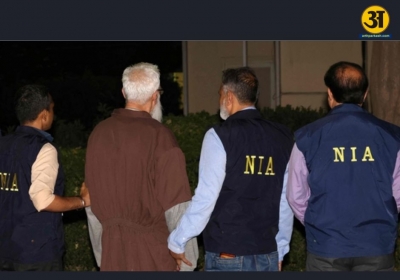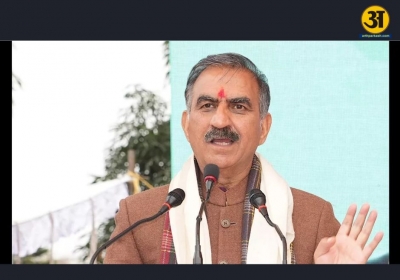
Punjab Cabinet
Led By CM, Punjab Cabinet Gives Green Signal To New Industrial And Business Development Policy, 2022
THE POLICY TO COME INTO FORCE FROM OCTOBER 17, 2022 AND WILL BE APPLICABLE FOR 5 YEARS
NEW POLICY TO LAY THRUST ON CREATING AN ENABLING ENVIRONMENT FOR THE INDUSTRIES & BUSINESS FOR BALANCE ECONOMIC GROWTH, JOB CREATION AND OVERALL DEVELOPMENT OF THE STATE
CHANDIGARH, FEBRUARY 3- With a thrust on creating an enabling environment for the Industries & Business for balance economic growth, job creation and overall Development of the State, the Punjab Cabinet led by the Chief Minister Bhagwant Mann on Friday approved the New industrial and Business Development Policy, 2022 (IBDP-2022) which shall be effective from October 17, 2022.
A decision to this effect was taken in a meeting of the Cabinet held under the chairmanship of the Chief Minister here at his office in Punjab Civil Secretariat.
Disclosing this here today a spokesperson of the Chief Minister’s Office said that the new policy will be applicable for 5 years from October 17, 2022 and will spur the Industrial Development in the State leading to more employment opportunities to the youth of the State. The new policy is structured ground key strategic focus areas namely infrastructure, Power, MSMEs, large enterprises, Innovation, Startup and Entrepreneurship, Skill Development, Ease of Doing Business, Fiscal and Non Fiscal Incentive, export promotion logistic, stakeholder engagement and grievance redressal. As per the policy, the state will develop 15 Industrial Parks covering general and sector specific requirements of various Industrial Sector and 20 rural clusters across the state.
As per the policy, the state will also allow setting up of dedicated country specific integrated Industrial Township to attract investment by allowing the infrastructure and other norms of the country. The policy also envisages that Punjab Small Industries and Export Corporation (PSIEC) will be strengthened and an online system for all the Estate Management services in a time bound manner shall be developed. The issuance of notification by the Department of Power for the incentive of electricity duty exemption shall be made online and time bound through Invest Punjab Business First Portal (IPBFP).
In order to give a boost to the MSME sector, the state under the new policy will set up a MSME Punjab, as a dedicated wing of the Department of Industries & Commerce with a focus on setting up a common facility and technology centre. For MSMEs, the state will also implement the World Bank assisted GoI scheme namely Raising and Accelerating MSME Performance (RAMP). Likewise, the state will also strengthen start-up Punjab to promote innovation and startups in the state through Punjab Innovation Mission with a special focus on Women/SC/Other Entrepreneurship.
Under the policy, gender/differently abled entrepreneurship/Rural Impact Startup/Women led startup and startups shall be given relaxation in public procurement with respect to experience and turn over. Punjab Skill Development Mission will work out specific skill development centres for various activities and will work with large employers in various industry sectors to create skill training facilities in partnership with such employers. As per the new policy, the Invest Punjab Business First Portal shall be integrated with National Single Window Portal and services of NHAI, PWD, RDA, Irrigation Department and Forest will also be included in it.
The policy also stipulates fiscal incentives for new units and also to existing units for expansion with or without modernization/diversification. Policy envisages that variable power tariff shall be freezed for five years @ Rs.5.50 Per KVAH and shall be applicable for manufacturing units/IT/ITeS Unit in the approved Industrial Park/Amusement park/ Adventure Parks developed on minimum area of 50 acres. The policy also provides attractive fiscal incentives for ultra-mega/mega projects, anchor unit, large units, MSMEs and incentives for rehabilitation of Sick Large units /MSMEs, Special Incentives for Units in border zone, Startup/incubators and first two units in border zone in each sector of manufacturing and service.
As per the policy, the manufacturing of Auto/Auto components including Electric Vehicle, Sports Goods including fitness equipment, Hand tools including Power Tools and Machine Tools, Agricultural Machinery and Equipment, Paper Based Packaging Units, circular Economy activity including shredding units, based management units and one district one product have been included in the category of thrust sector for the purpose of higher fiscal incentives. The fiscal incentives include 100% exemption from stamp duty, 100% exemption from CLU/EDC to the units in thrust sector and anchor units and 100% exemption from electricity duty from 7 years to 15 years.
Policy also envisages Investment subsidy by way of reimbursement of net SGST upto 200% of FCI over a period of 7 to 15 years. MSMEs are also being provided fiscal incentive in the area of technology, finance, marketing, environmental compliance, e-commerce and freight subsidy for exporting units and exemption from ground water charges. The new Micro and Small enterprises, exporting units and service enterprises engaged in providing research and development activities will also be provided 50% Capital Subsidy on the fixed capital investment up to Rs 50 lakh. As per the policy, the Anchor Unit have been provided incentive of employment generation subsidy upto Rs.36000/- per employees per year for a period of 5 years and @ of Rs.48000/- for woman SC/BC/OBC employees.
The policy provides sector specific special incentives like 100% exemption of market fees/RDF upto 100% of FCI over a period of 10 years to the food processing industry, Capital Subsidy to IT/ITeS @, 50% of the FCI upto Rs.2.5 Crore per unit, 5% interest subsidy @ 10 lacs per years for five years to the apparels and made up and technical textile as a additional support to such units covered under A-TUB Scheme of GOI. Similarly, 50% top up subsidy to the first 10 ESDM units supported under SPECS Scheme of MEITY limited to Rs. 10 crore per unit. The replacement of existing boilers with paddy straw based boilers have been provided incentive of SGST upto 75% cost of boiler and exemption of stamp duty for purchase of storage of paddy adding that this incentive shall be available to the first 50 units.
Under the Policy, Development of private industrial parks shall be encouraged and 100% exemption of CLU/EDC shall be provided on the Industrial and EWS residential component to an Industrial Park set up within a minimum area of 25 acres (10 acre for IT). The private industrial park set up by SPV shall be provided additional incentive of Capital Subsidy @ 25% maximum 25 Crore. The building bye-laws shall be relaxed by the Department of Housing and Urban Development (HUD), logistic park shall be developed in sector 102. Mohali and 50% of the external development charges shall be spent on the improvement of Industrial infrastructure in the Industrial Zone.
The fiscal incentive shall be processed through invest Punjab Business First Portal and the cases involving fixed capital investment upto Rs 25 crore shall be sanctioned at the district level and cases above Rs 25 Crore shall be processed at state Level and the incentive shall be disbursed by maintaining an online State Level Seniority. There will be representation of industry in the District Level and State Level Committee constituted for approval of fiscal incentive cases.
As per the policy, the units which have been filed Common Application Form (CAF) under IBDP-2017 upto 10.9.2022 may avail the incentive under GDP-2017 provided they attain commercial production within five years from filing of CAF. The units who have filed CAF between 10.9.2022 to 16.10.2022 may opt IBDP-2017 provided they fulfill certain conditions. The others who have filed CAF under IBDP-2017 and are not in production till 16.10.2022 may opt (BDP-2022 by submitting an online option within 90 days from the notification of this policy.
Read It:
In a first, Mann Govt to provide uniforms to nursery students: Harjot Singh Bains





